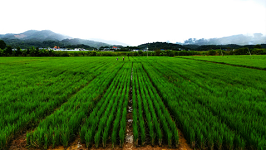The global population is projected to reach 8 billion on 15 November 2022, according to the UN’s recently-released World Population Prospects 2022.
Countries of sub-Saharan Africa are expected to continue growing through 2100 and to contribute more than half of the global population increase anticipated through 2050. How can we continue to feed the world? Perhaps perennial rice, which doesn’t have to be replanted every season, may be part of the answer.
A new report in Nature Sustainability highlights agronomic, economic, and environmental indicators of perennial rice cultivation across Yunnan Province, China. This report was also cited in Science, earning the distinction of being simultaneously featured on these scientific journals.
“Our findings show perennial rice delivers significant labor and costs savings for farmers. But it needs to be done right – that’s why we emphasize promoting perennial rice technology – not just passing farmers the seeds. Farmers need to master new cultivation techniques to maintain high yields in subsequent harvests,” says Dr. Shilai Zhang, professor at Yunnan University’s School of Agriculture and first author of this report.
Dr. Zhang shares that after every harvest, it is essential to water and fertilize perennial rice. This helps to maintain its roots which is vital as this crop relies on rhizomes to reproduce. The team teaches farmers cultivation techniques accumulated through 13 years of research.
The team hybridized annual rice with its perennial African relative Oryza longistaminata through its research and started large-scale field experiments in 2016, and released the first commercial perennial rice variety, PR23, in 2018. From next-generation sequencing, 16.16% of the PR23 genome consists of Oryza longistaminata.
Farmers growing perennial rice put in almost 60% less labor and spent nearly half on seed, fertilizer, and other inputs while enjoying similar yields to annual rice. This is why perennial rice cultivation hit 15,533 hectares in 2021, including 44,752 smallholder farms.
Dr. Zhang comments that there is much to do, noting that perennial rice strains are sensitive to local climate conditions-one strain may grow well in Guangxi and Guizhou which are close to Yunnan but don’t do as well in other Chinese provinces.
Large-scale localization of perennial rice
In April this year, Yunnan University and BGI established a perennial rice joint venture. “Large-scale localization is the next step for perennial rice. By partnering BGI, our team may leverage on high-throughput sequencing to identify perennial rice lines more quickly with the desired agronomic traits that suits local climate conditions. In addition, BGI’s network will help perennial rice go global with the right support,” said Dr. Zhang.
Perennial rice has been promoted to many countries, including Uganda, Ivory Coast, Laos, Myanmar and Bangladesh. Uganda is a pioneer, starting perennial rice trials five years ago. Working with local partners, specific perennial rice varieties may be developed by Yunnan University and BGI to further raise farmers’ incomes.
Dr. Zhang notes, “Taste and local climate adaptability are the top requests. For example, Myanmar consumers prefer a softer variety of rice. In areas where the average temperature is high, they seek a heat-resistant variety.”
Dr. Zhang notes that Dr. Fengyi Hu, the university’s research team leader, correctly forecasted that PR107 will do very well in Africa due to its’ heat-resistant and blight-resistant properties, “Rice breeding requires a lot of experience and good understanding of local climate conditions. We look forward to working with new partners to promote perennial rice across the world to enhance global food security and farmers’ incomes.”
Yunnan University consists of 26 schools, 10 research institutes, two independent schools and a graduate school. A total of 15 papers by its professors have been published in world-famous academic publications, like Nature and Science.
BGI Genomics, headquartered in Shenzhen China, is the world’s leading integrated solutions provider of precision medicine. In July of 2017, as a subsidiary of BGI Group, BGI Genomics (300676.SZ) was officially listed on the Shenzhen Stock Exchange. BGI has topped the Asia Pacific and China life science corporate institution ranking table for the seventh year running, released in the 2022 Nature Index Annual Tables.

